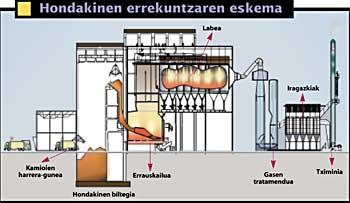Greenpeace warns of the dangers of incinerators
2001/05/15 Galarraga Aiestaran, Ana - Elhuyar Zientzia
In Britain there has been a debate on this issue, since Greenpeace has denounced the State's intention to build more incinerators. However, the health problems generated by incinerators cannot be forgotten and, to inform the public, they have published a report in which the damage caused by the chemicals expelled by incinerators is collected.

People living around incinerators receive toxic substances by various means, such as breathing, contaminated food, or contact with the skin. Allergies and breathing problems appear, but also some types of cancer, heart and newborn problems with health problems. For example, between 1974 and 87 70 municipal waste incinerators were studied and between 1953 and 80 data were collected from waste incinerators from 307 hospitals. According to them, cases of childhood cancer that live around doubled those of other places. According to Greenpeace, these data are very significant and the government should take action.
The most common chemicals that remove incinerators are dioxins, cadmium, mercury, and other tiny particles. The new incinerators, although they emit less particles in the atmosphere, do not generate less problems. According to Greenpeace, these particles are now in ashes. Thus, when they bury the ashes, they contaminate the soil.
For all this, Greenpeace calls for a policy change that protects the environment to ensure human health.

Gai honi buruzko eduki gehiago
Elhuyarrek garatutako teknologia






